Why Problem Solving is Important in the Workplace
What is problem solving, what is an example of problem solving, why problem solving is important, watch a video instead.
"As a competency, problem solving is a common performance criterion for roles that require staff to solve urgent or complex problems." Ben Schwencke Consultant

How to improve problem solving?
How to assess candidates on their problem solving, our recommended test partnership assessments for measuring problem solving, want to hire for problem-solving skills, other articles you may be interested in, candidate selection: a definitive guide, ai in recruitment: impact, implications, and the future, skills based hiring: an ultimate guide, how norm groups work in psychometric assessments.
Why are problem solving skills in the workplace so important? Subskills, benefits, scenarios
Test your candidates' problem-solving skills with testgorilla.

The importance of problem-solving skills in the workplace can’t be overstated. Every business and job role has its problems. From entry-level hires to senior staffers, every one of your employees will face challenges that don’t can’t be answered by doing a quick Google search – or asking ChatGPT to come up with solutions.
That’s why employers must hire people with excellent problem-solving skills, especially for roles that require dealing with complex business challenges, tight deadlines, and changing variables – for example, when recruiting leaders .
But what are problem-solving skills? What role do they play in the workplace?
And, most importantly, how can you evaluate candidates’ skills before you hire them?
Table of contents
What are problem solving skills, the benefits of problem solving skills: why are problem solving skills important , examples of problems at the workplace – and how problem solving skills can help, how to assess problem solving skills, evaluate problem solving skills and hire candidates who can think for themselves.
To fully understand the importance of problem-solving skills in the workplace, it’s important first to understand the broad skill set that we commonly refer to as “problem solving skills”.
Generally, problem-solving refers to a person’s ability to successfully manage and find solutions for complex and unexpected situations.
Candidates with great problem-solving skills have a combination of analytical and creative thinking. They’re comfortable with making decisions and confident enough to rise to challenges in the workplace.
These candidates possess a combination of analytical, creative, and critical-thinking skills – and a high level of attention to detail . As a result, they will quickly identify problems when they arise and identify the most effective solutions.
They’ll also identify the factors and forces that might have caused the problem and instigate changes to mitigate future challenges.
There are six key problem-solving skills that you should look for when assessing job candidates:
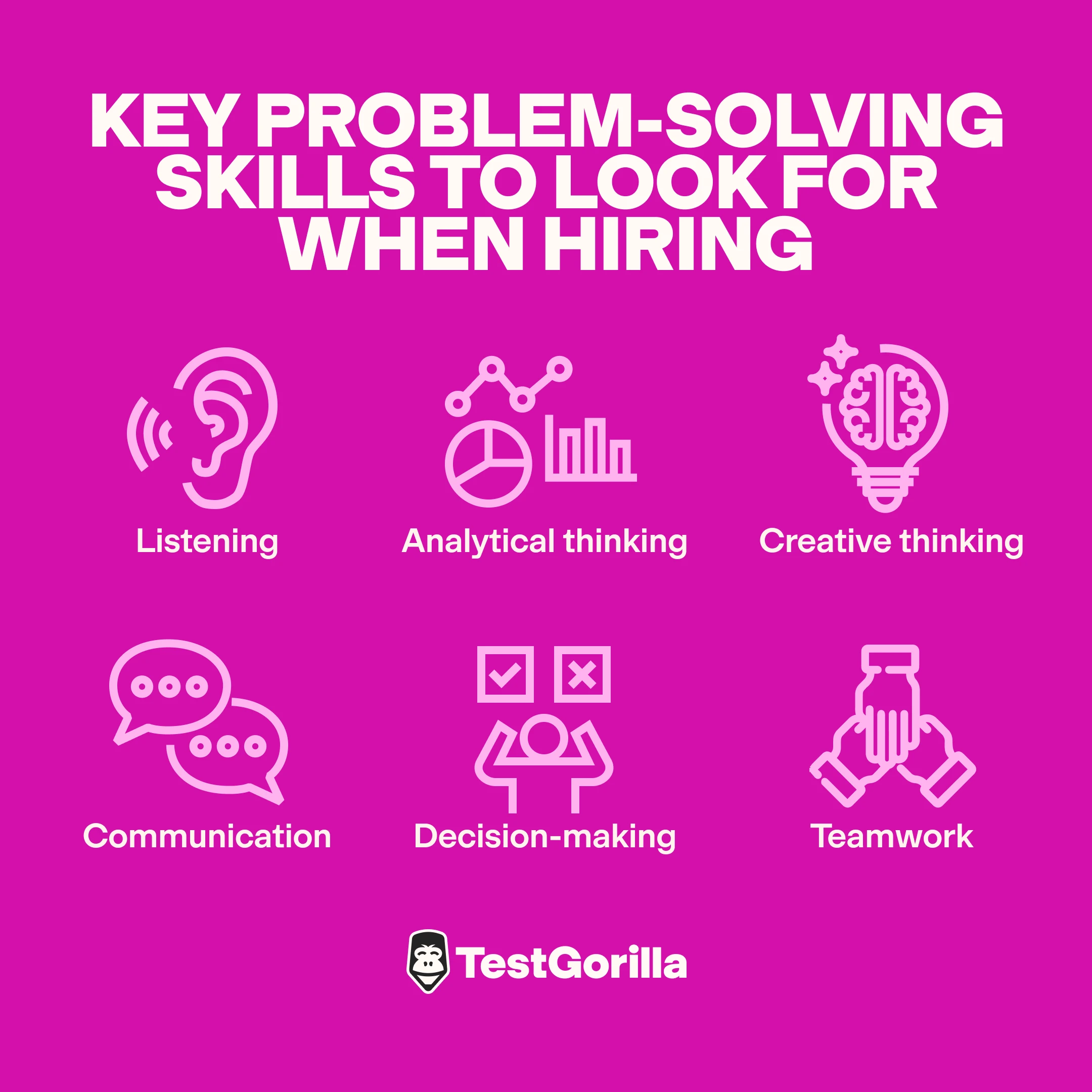
1. Listening skills
Active listeners are generally great problem solvers.
They can listen to those around them to gather the information needed to solve the problem at hand. They also recognize the importance of valuing others’ opinions and experiences to help understand why the problem occurred and define the best course of action to remedy it.
2. Analytical thinking skills
Analytical thinkers can identify the logical reasons why a problem occurred, what the long-term effects of the issue could be, and identify how effective different solutions might be to select the most practical one.
That’s why it’s essential to assess analytical thinking skills during recruitment.
3. Creative thinking skills
Creative thinkers can balance their analytical skills with creative approaches to challenges. Creative thinking skills enable individuals to uncover innovative and progressive solutions to problems.
In this way, they’re able to provide new perspectives and provide imaginative and experimental solutions to all kinds of problems.
4. Communication skills
Problem solvers should also possess great communication skills . The ability to effectively relay complex information thoroughly yet succinctly is a huge benefit for employers working in fast-paced environments.
5. Decision-making skills
Those with problem-solving skills will also possess the ability to make decisions and be confident in them. This is important, because most problem-solving involves making firm decisions to reach a successful outcome.
6. Teamwork
Although problem-solvers need to be independent thinkers, it’s also vital for them to work well as part of a team .
Determining the best solution often requires collaboration, so it’s important that candidates can demonstrate how they can motivate others to come up with the best solutions and work with them to help develop and implement solutions.
Problem-solving skills enable you to find candidates who are cognitively equipped to handle anything their jobs throw at them.
Problem solvers can observe, judge, and act quickly when difficulties arise when they inevitably do. Moreover, they are not afraid of the unknown, which is invaluable to employers who rely on their employees to identify and solve problems.
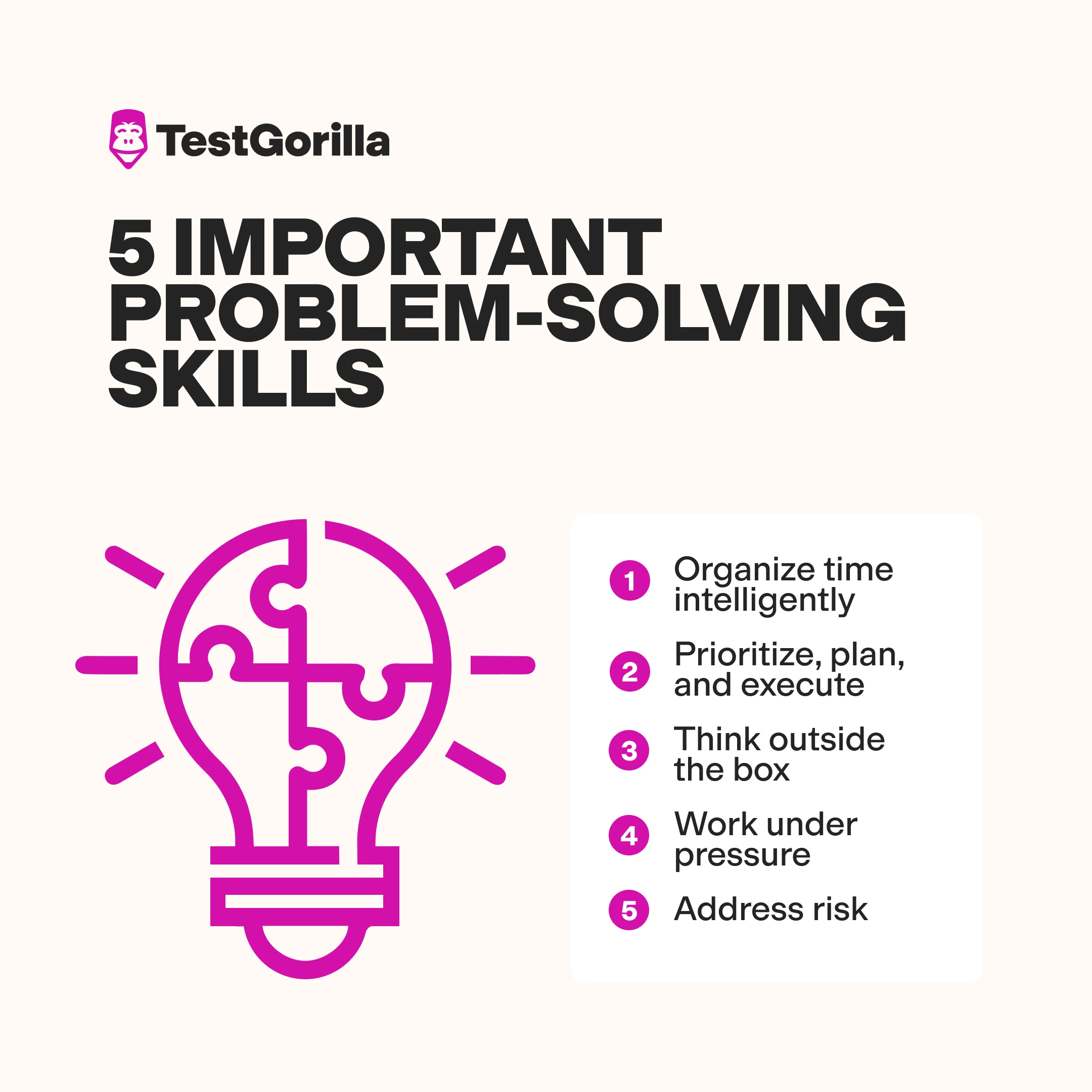
There are several important benefits of problem-solving skills in the workplace. Below, we’ll go through five of the most significant ones that all problem solvers can bring to their roles and workplaces:
1. Ability to organize their time intelligently
Time management skills can often be underlooked as one of the benefits of problem-solving skills in the workplace.
However, those with problem-solving abilities also typically possess stellar time-management skills. The ability to manage their time wisely and laser-focus on what’s important to the business will lead to better decision-making and business impact.
2. Ability to prioritize, plan, and execute strategies
Problem solvers have no issue with carefully assessing customer and business needs and deciding how to prioritize, plan, and execute strategies to meet them. They can manage all moving parts and strategize to meet multiple unique demands.
3. Ability to think outside the box
Problem solvers can often identify hidden opportunities in problems. Thinking outside of the box is an important problem-solving skill in the workplace, because it can often lead to better outcomes than the originally expected ones.
4. Ability to work under pressure
This is often one of the most important benefits of problem-solving skills in the workplace. Problem solvers often work well under pressure, for example when dealing with short deadlines and changing project requirements.
Depending on your workplace culture, you might prefer someone who can deliver quick solutions or someone who takes their time to identify the next steps. Both are valid and important problem solving qualities.
5. Ability to address risk
Planning is an important problem-solving skill. Problem solvers are not just equipped to deal with the problem at hand but are also able to anticipate problems that will arise in the future based on trends, patterns, experience, and current events.
Let’s now look at some specific examples of problems that could arise at the workplace – at any workplace, really – and how employees’ problem solving skills can help address each issue.
Below, you’ll find five typical scenarios where problem solving skills are essential.
Conflict between team members
Poor team dynamics or lack of a collaborative spirit might result in frequent workplace conflicts – especially within larger teams.
For example, members of cross-functional teams might disagree on the way they should address a particular issue or even on the priority they should give to it.
How problem solving skills can help:
Teamwork is essential when solving conflict – and a cornerstone of effective cross-functional team leadership .
For this, coworkers need to share a common understanding of the team’s goals and also be willing to work towards achieving them, even when they disagree on the specific approaches to each goal. The ability to understand others’ perspectives, analyze information critically, and come up with a few different solutions is key to finding a common ground and making progress on the team’s objectives.
Inefficient processes
Outdated, inefficient processes can reduce productivity and frustrate employees.
Multi-step approval processes are a typical example of this. Having multiple layers of approval for routine decisions can significantly slow down team progress and lead to missed opportunities.
Analytical thinking skills are key in identifying inefficiencies and building better procedures. Employees or team leads can build flowcharts that speed up decision making without having to ask a supervisor’s permission at every step of the process.
Book a free live demo with us and learn how quick and easy it is to create an online skills assessment

Poor communication can lead to misunderstandings and lack of clarity and direction – which, in turn, can be detrimental to team performance.
For example, if you’re a remote-first company, maintaining clear and effective remote communication can be challenging.
The over-reliance on emails and messaging apps might make it feel like teams are communicating effectively and are always connected. However, the lack of non-verbal cues and face-to-face interactions might make it more difficult to build rapport and a positive workplace culture .
Listening skills are essential to solving communication issues – and good listeners are often excellent at solving problems by recognizing, understanding, and acknowledging others’ points of view.
One-on-one meetings enable people to communicate more freely and effectively and solve challenges together, so consider encouraging team members to hop on a call each time they encounter a difficult challenge.
Additionally, you can help employees bond with each other with some remote team building activities to improve team cohesion. Plus, problem solving challenges can be excellent team building exercises.
Technological disruptions
New technologies often disrupt the usual ways of doing things – and sometimes, this can be disruptive for entire teams’ work.
For example, generative AI and automation technologies have revolutionized numerous types of work, including data analysis, marketing, customer service, and even content creation.
Creative thinking and cognitive flexibility are among the top 10 most important skills of the future , according to the World Economic Forum. Both are essential for adopting new technologies successfully – and finding ways to make the most out of each new tool to improve productivity.
Insufficient onboarding resources
Team members may struggle to do their best work if they haven't received proper training or resources.
For example, start-ups that experience rapid growth might hire a few employees at once – or even entire teams.
If they fail to allocate sufficient time and resources to onboarding new hires, this might lead to lost productivity, a lacking sense of belonging, or increased turnover. That’s true not only for junior employees but also for newly hired senior leaders , as the Harvard Business Review points out.
Your leadership team’s analytical and decision-making skills are crucial in enabling them to distribute limited resources in a way that would give their teams the best chances of success.
To build a solid onboarding process , you need leaders who are able to take ownership of it – and who have the right problem-solving skills.
Many organizations use problem-solving interview questions to identify the right candidates for their job openings. However, the most effective way to assess problem-solving skills is with pre-employment skills assessments .
That’s because skills tests provide an objective way to quantify a candidate’s problem-solving skills in a way that isn’t possible during an interview.
How problem solving skills tests work
Tests like TestGorilla’s problem-solving skills test assist organizations in finding candidates who are able to quickly identify the key elements of the problem and work through the problem at speed without making mistakes.
By presenting candidates with a wide range of questions related to typical problem-solving scenarios, hiring teams can rank their candidates based on an intensive assessment of each candidate’s skill level.
The test specifically evaluates whether a candidate can perform problem-solving tasks like:
Creating and adjust schedules
Prioritizing items based on a given set of rules
Interpreting data and applying logic to make decisions
Analyzing textual and numerical information to draw conclusions
As you can see, even the best interviewer would have trouble assessing each of these skill areas while still covering all the other questions that they need to ask.
If you’re convinced of the importance of problem-solving skills in the workplace and want to build a team of employees that can think independently and solve their own problems without constant supervision, assess problem-solving skills during the hiring process.
Problem-solving skills tests like ours are an excellent way to achieve this – especially if you combine them with other skills tests. Check out our extensive test library for other tests you can use in your talent assessment process to hire the best talent.
Sign up for our free plan to start building your first assessment – or schedule a demo with one of our experts to see how to evaluate applicants’ problem solving skills quickly, efficiently, and without bias.
Related posts

What to pay an executive assistant

What to pay a full-stack developer: Salary ranges, benefits, and market trends

Hiring introverts vs. extroverts: 4 things to consider
You've scrolled this far
Why not try TestGorilla for free, and see what happens when you put skills first.

Latest posts

The best insights on HR and recruitment, delivered to your inbox.
Biweekly updates. No spam. Unsubscribe any time.
Skills tests to hire the best
Our screening tests identify the best candidates and make your hiring decisions faster, easier, and bias-free.
Free resources

This handbook provides actionable insights, use cases, data, and tools to help you implement skills-based hiring for optimal success

A comprehensive guide packed with detailed strategies, timelines, and best practices — to help you build a seamless onboarding plan.

A comprehensive guide with in-depth comparisons, key features, and pricing details to help you choose the best talent assessment platform.

This in-depth guide includes tools, metrics, and a step-by-step plan for tracking and boosting your recruitment ROI.

A step-by-step blueprint that will help you maximize the benefits of skills-based hiring from faster time-to-hire to improved employee retention.

With our onboarding email templates, you'll reduce first-day jitters, boost confidence, and create a seamless experience for your new hires.

Get all the essentials of HR in one place! This cheat sheet covers KPIs, roles, talent acquisition, compliance, performance management, and more to boost your HR expertise.

Onboarding employees can be a challenge. This checklist provides detailed best practices broken down by days, weeks, and months after joining.

Track all the critical calculations that contribute to your recruitment process and find out how to optimize them with this cheat sheet.

Benefits Of Having Problem Solving Skills For HR Professionals In Workplace

Problem-solving skills are crucial for success in the workplace, and this is especially true for HR professionals. In today’s fast-paced business environment, HR professionals often face complex challenges that require quick and effective solutions.
HR professionals can improve decision-making, enhance productivity, and reduce costs by developing strong problem-solving skills. These skills are also essential for advancing to upper management roles and demonstrating competencies in the SHRM model.”
Here, we will explore the benefits of having strong problem solving skills for HR professionals and strategies for developing and utilizing these skills effectively.
Table of Contents
Understanding the Role of HR Professionals
HR professionals play a critical role in organizations by managing the most valuable resource people. Their responsibilities include recruiting and hiring employees, providing training and development opportunities, managing employee relations and benefits, and ensuring compliance with labor laws and regulations.
They are also responsible for developing and implementing policies and procedures to promote a positive and inclusive work environment. Influential HR professionals must have many skills, including communication, problem-solving, strategic thinking, and leadership.
Must be able to balance the needs of employees with those of the organization and to work collaboratively with managers and other stakeholders to achieve shared goals. HR professionals are vital to the success of any organization, as they are responsible for developing and maintaining a skilled and engaged workforce that can drive growth and profitability.
Benefits of Problem-Solving Skills for HR Professionals
Having solid problem-solving skills can provide numerous benefits for HR professionals. Here are some of the most significant advantages:
Improved Decision-Making
Problem-solving skills enable HR professionals to make informed decisions quickly and effectively. They can choose the best course of action to resolve complex employee-related issues by identifying potential solutions and analyzing their outcomes.
Enhanced Productivity
HR professionals with strong problem-solving skills can streamline processes and procedures, reducing the time and effort required to handle employee relations issues. This leads to increased productivity and efficiency within the organization.
Reduced Costs
By effectively managing employee relations issues and reducing conflicts, HR professionals with problem-solving skills can save the organization money. This includes avoiding costly legal disputes, improving employee retention rates, and reducing recruitment and training costs.
Increased Career Advancement Opportunities
HR professionals with strong problem-solving skills are highly valued in the industry. Possessing these skills can lead to more significant opportunities for career advancement, higher salaries, and more challenging and rewarding roles.
Competitive Advantage
Organizations with HR professionals with effective problem-solving skills have a competitive advantage over those without. They can handle complex employee relations issues more efficiently, reducing costs and improving productivity, ultimately leading to better business outcomes.
How Can Problem-Solving Skills Impact Business Outcomes?
Problem-solving skills can have a significant impact on business outcomes. HR professionals with strong problem-solving skills can help their organizations by identifying and resolving issues that affect employee satisfaction, productivity, and retention.
They can also make informed decisions about the allocation of resources, the implementation of new policies, and the development of new strategies.
Additionally, by fostering a culture of problem-solving, organizations can encourage innovation and creativity, leading to the development of new products, services, and processes.
This can help organizations stay competitive in their respective markets and adapt to changing business environments. Overall, problem-solving skills are valuable for HR professionals, and their impact on business outcomes cannot be overstated.
Developing Problem Solving Skills For HR Professionals
Problem-solving is a skill that can be developed with practice and experience. Here are some ways HR professionals can enhance their problem-solving skills :
Attend Training and Development Programs
HR professionals can attend training and development programs to learn problem-solving techniques and strategies. These programs also provide opportunities to practice problem-solving in a safe and supportive environment.
Seek Mentorship
HR professionals can seek mentorship from experienced problem solvers within their organization or industry. Mentors can provide guidance and advice on how to approach complex employee-related issues.
Collaborate with Others
Collaborating with colleagues from different departments can expose HR professionals to different perspectives and problem-solving techniques. It helps them develop a more comprehensive understanding of their issues and identify more effective solutions.
Stay Informed
Keeping up with industry news and trends can help HR professionals stay informed about emerging challenges and opportunities. This can help them anticipate problems and develop proactive solutions.
Practice Reflective Thinking
Reflective thinking involves examining one’s thoughts and actions to identify areas for improvement. By reflecting on their problem-solving experiences, HR professionals can determine what worked well and what did not and adjust their approach accordingly.
Challenges That HR Professionals May Face In Problem-Solving
While problem-solving is essential for HR professionals, it can be challenging. Here are some of the challenges that they may face:
- Emotions : Employee-related issues can be emotionally charged, and it can be challenging to separate emotions from facts. HR professionals must learn to approach problems with empathy while also remaining objective.
- Limited Resources : HR professionals may need more resources, such as time, budget, or personnel, to address complex problems effectively. This can require them to be creative and find innovative solutions.
- Legal Compliance : Many employee-related issues have legal implications, and HR professionals must ensure that their solutions comply with local, state, and federal laws and regulations.
- Resistance to Change : Employees or upper management may resist changes proposed by HR professionals, even when they are the best course of action. HR professionals must learn to communicate effectively and build consensus to overcome this challenge.
- Ambiguity : HR professionals may sometimes need guidance or clarity with no solution. In these cases, they must learn to navigate complexity and make informed decisions based on the available information.
Read Also: Why Is Critical Thinking Important For Problem Solving And Decision Making?
How Can HR Leaders Assess Problem Solving Skills In Their Teams?
Assessing problem-solving skills is essential for HR leaders to ensure that their team can effectively handle the challenges that arise in the workplace. Here are some ways HR leaders can assess problem-solving skills:
- Ask Behavioral Interview Questions: Behavioral interview questions assess how candidates have handled real-life situations. HR leaders can use these questions to determine how well team members have solved problems in their previous roles.
- Use Case Studies: Case studies allow team members to apply their problem-solving skills to real-life scenarios. HR leaders can use case studies to observe how team members approach and solve problems.
- Conduct Problem-Solving Exercises: Problem-solving exercises allow HR leaders to see how team members think on their feet and approach problems in real time. These exercises can be in the form of brainstorming sessions or role-playing activities.
- Review Performance Metrics: HR leaders can review team members’ performance metrics to assess their problem-solving skills. For example, if an HR professional can reduce employee turnover by implementing a new retention strategy, this demonstrates their ability to solve a complex problem.
- Assess Soft Skills: Soft skills, such as communication, teamwork, and adaptability, are essential for effective problem-solving . HR leaders can assess these skills through observation, colleague feedback, and self-assessments.

Final Words
Problem solving skills for HR professionals are essential for HR to navigate the challenges that arise in the workplace effectively. By developing their problem-solving skills , HR professionals can contribute to the success of their organization by improving processes, resolving conflicts, and making informed decisions.
In addition, HR leaders can assess the problem-solving skills of their team through various methods, such as behavioral interview questions, case studies, problem-solving exercises, performance metrics, and soft skill assessments. By doing so, HR leaders can identify areas for improvement and ensure that their team can effectively handle the challenges that arise in the workplace.
Overall, the benefits of problem-solving skills for HR professionals are numerous. Investing in developing these skills can lead to improved performance, increased employee satisfaction, and a more successful organization.
Related Articles

Finding Strength in Faith: How Trusting God Can Improve Your Mental Health

How to Assist an Employee Who Struggles With Time management? Explained!
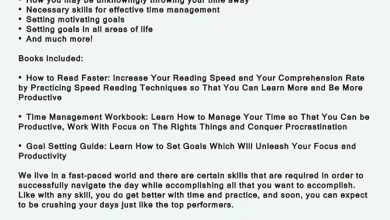
Time Management Tips for Goal Setting: Unleash Success!
- How Time Management Can Reduce Stress and Improve Your Well-being
Leave a Reply Cancel reply
Your email address will not be published. Required fields are marked *
Save my name, email, and website in this browser for the next time I comment.
We are offering inhouse programs to upskill your entire organization

The Importance of Problem-Solving Skills in the Workplace
November 10, 2022 - job & career, discover your own management 3.0 path: answer a few questions to get personalized recommendations.
Tell us a bit about yourself, and we’ll tailor our recommendations to match your interests. Just answer a few quick questions below to get started!
Our Recommendation Based on Your Answers
Build upon the foundation of your knowledge by delving deeper into the main principles and practices of Agile Leadership with our Agile Change Leadership Workshop .
Build upon the foundation of your knowledge by delving deeper into the main principles and practices of Agile Leadership with our Agile Co-Creation Leadership Workshop .
Build upon the foundation of your knowledge by delving deeper into the main principles and practices of Agile Leadership with our Agile Team Leadership Workshop .
Build upon the foundation of your knowledge by delving deeper into the main principles and practices of Agile Leadership with our Agile People Leadership Workshop .
If you are interested in other options we offer, please check our Learning Path .
The Foundation Workshop is where your Management 3.0 learning journey truly begins, and you will learn about the principles, pillars and popular practices you can use right away.
The Foundation Workshop is where your Management 3.0 learning journey truly begins, and you will learn about the principles, pillars and popular practices you can use right away. If you are interested in other options we offer, please check our Learning Path .
Agility in HR Workshop by Management 3.0 is the popular Management 3.0 Foundation Workshop with additional content and ICAgile accreditation targeted for people who work in or closely with human resources.
With our global team, we provide tailor-made programs to enhance mindsets and skills for entire organizations, ensuring your business is future-ready! Learn more about our Inhouse Training Programs .
Our Company License gives your learning team, transformation staff and leaders the ability to facilitate the Management 3.0 mindset, practices and official workshops yourselves.
You sound like a match for our global Facilitator community! Get your Management 3.0 Facilitator License now !
We have defined certain requirements that you must meet to become a licensed Management 3.0 Facilitator. We offer both workshop-based and practice-based approaches. Read more about the requirements .
In the Official Management 3.0 Community you can connect with curious and focused like-minded leaders from all over the world to practice, share, and grow!
Our practical, hands on and tangible tools and management games are the best way to foster transformational change within teams, companies and even on a personal level.
According to Management 3.0 Facilitator Ilija Popjanev , problem solving is essential for individuals and organizations as it enables us to control all aspects of our business environment. In this article, Ilija looks into problem-solving skills, how the problem-solving process works, and which tools help you to advance this skill set.
In this article you will learn about:
What is Problem Solving?
- Problem-Solving in Six Easy Steps
Why is Problem-Solving so Important for Leaders, Teams, and Organizations?
Problem-solving techniques in the workplace, better employee experience by using problem-solving tools from management 3.0, how do employees develop problem-solving skills, what skills make a good problem solver.
In the last few years, we have been living 100% in the VUCA world, with so many unpredictable and complex threats and challenges. As a result, organizations must create a sense of urgency to redesign their present business models and to rebuild the foundations for the future of work.
All companies now need effective problem-solving skills and tools at all levels, starting with individuals and teams, and finishing with their leaders and managers. This new reality enables growth and success only for those well-equipped and empowered by effective problem-solving skills and tools.
One of the behaviors of Management 1.0 style is to constantly look for ways to stop “fighting fires,”. Instead, the Management 3.0 style seeks to “find the root cause” of the problem, and then to refocus, improve, and plan a different way for fulfilling workplace tasks.
Management 3.0 provides effective tools and principles for building the system for effective problem solving. It provides us with techniques we can use to understand what is happening in our world, to identify things we want to change, and then apply everything that needs to be done to achieve the desired outcome. We live by the motto: fail fast, recover quickly, and learn from the failures.
The agile way of working does not mean being perfect, but instead it allows for failures and sees them as opportunities to learn, grow, and adapt . Perfection is useless if we do not provide value fast for our customers. That is why problem solving is the foundation for continuous improvement, learning, and collaboration, which leads to innovations and success in ever-changing economies and the new normal that we now live in.
The definition of problem solving according to the Merriam-Webster Dictionary is: “The process or act of finding a solution to a problem.” Similarly, the Oxford English Dictionary describes problem solving as: “The process of finding solutions to difficult or complex issues.”
For me, Problem-solving is a process of understanding and owning the problem, constant pursuit for solutions and improvements, and putting into action the best option for the desired outcome.
Understanding context and interacting with our teammates are the essence of effective problem-solving. We must clearly understand the complexity of our environment and the specifics of the context because things continuously change and evolve. Here, the Complexity Thinking Guidelines may help you to better understand what is happening and how to navigate complex environments more effectively.
We must have a lens through which to see problems as opportunities to improve, and regard our teams as sources of knowledge and experience. We have to connect people and opportunities in ways that can facilitate the best solutions for the problems that we are handling. Try using the Personal Maps , an excellent tool for bringing teams together and fostering diversity, respect, trust, and collaboration.
Today, all innovations and solved problems are team efforts because teams constantly improve their toolbox and competencies. Teams want to create something that was not there before, and which maximize their knowledge and resources.
To accomplish that, they need to build a process in a few easy steps:
- Be present, observe what is happening in your world, and define the problem.
- Review where you are now and what influences that state.
- Constantly improve and change things by using creative tools and tactics.
- Seek solutions and alternatives to make changes more effective.
- Make team decisions about which tools and solutions should be used.
- Implement improvements, monitor the process, and constantly adapt!
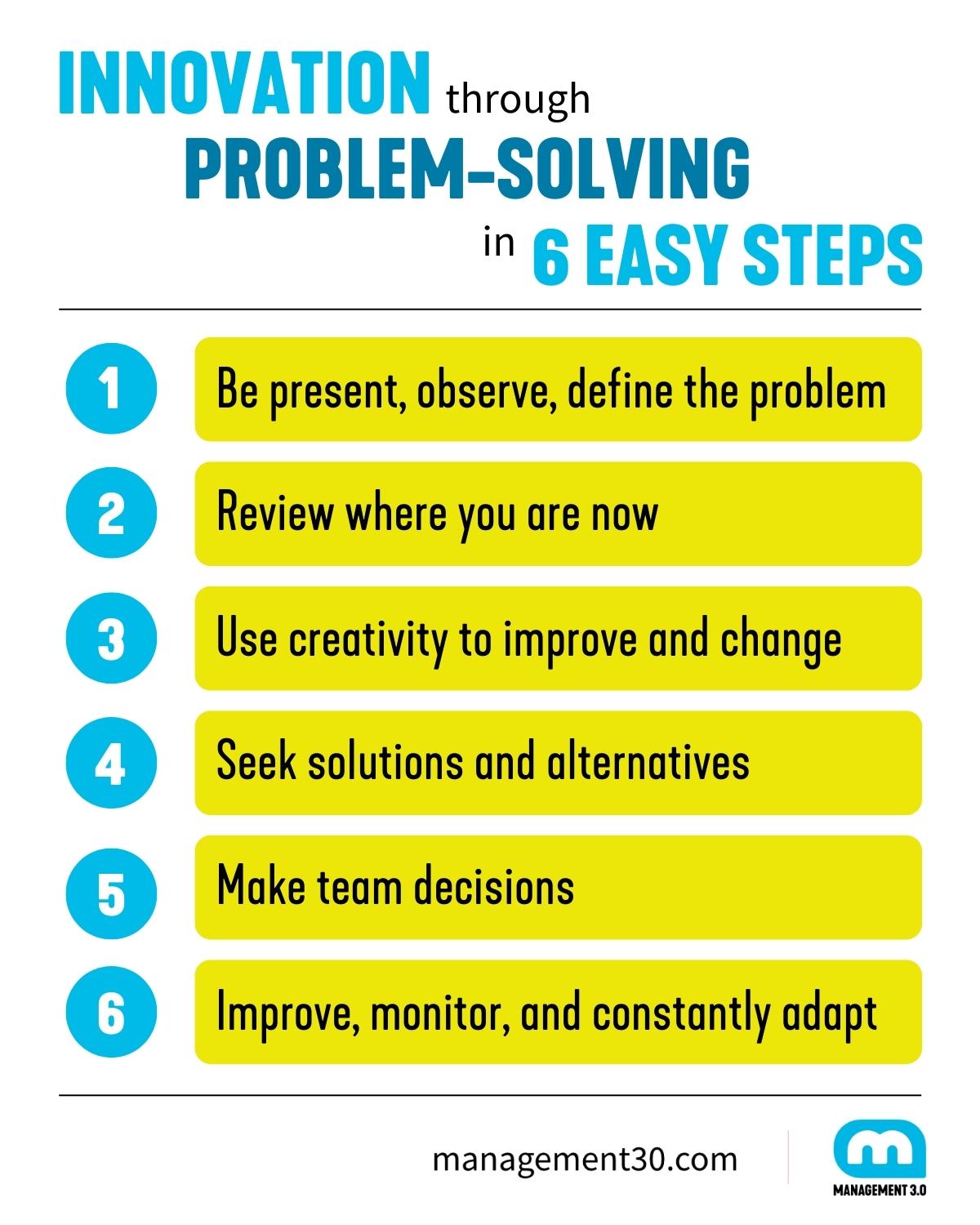
At this stage, by following the Management 3.0 principle of “Improving the system,” you can use the tools Celebration Grids , combined with Yay! Questions , to best engage the team in the problem-solving process, while keeping track of what is working well, what can be changed, and what new options exist.
Documenting everything is an integral part of the problem-solving process. By using Celebration Grids, you are gamifying the process and keeping the team flow and energy on a higher level.
Also read: What type of problem-solver are you?
Problem-solving is crucial for everyone: individuals, teams, leaders, organizations, and ultimately for all stakeholders because it empowers us to better control the environment and everything that is going on in our world. Try using Delegation Poker so that teams can become more empowered to solve problems both alongside leaders and within their organization.
Today, the speed of problem solving is important, and that is why organizations must give more power and authority on a team level , so employees can react quickly and even prevent problems. As a leading indicator, the Management 3.0 tool Problem Time can help you measure the time spent on uncompleted problem-solving tasks and activities; this is a valuable add-on to “lead and cycle time” lagging indicators, with which you measure the time taken on completed tasks.
Developing and refining problem-solving skills through constant practice and experimentation can refine the ability to solve problems and address issues with more complexities.
We may face various challenges in our daily work, and effective problem-solving can make a difference.
Make a Difference with Problem-Solving
- Problem-solving skills are important if you want to add more value . As an agilist, your objective is not to be perfect but to maximize the value you provide for all stakeholders. Start fast, deliver value early, manage failures and prioritize tasks by setting the urgency criteria.
- Problem-solving skills are important if you need to improve your results. You have to accept the complexity of success factors and better understand the need for changes and improvements in a continually uncertain environment. Results depend on your problem-solving skills!
- Problem-solving skills are important if you have to fix things that do not work. When your processes are not working as planned, problem solving will give you the structure and mechanisms to identify issues, figure out why things are broken, and take actions to fix them.
- Problem-solving skills are important when you have to address a risk. Sharpen your problem-solving skills to anticipate future events better and increase the awareness of cause-and-effect relationships. This enables you to take the right actions and influence the outcomes if issues do occur.
- Problem-solving skills are important if you work simultaneously on several projects. You should apply the same problem-solving techniques when you work on multiple projects, business functions, market segments, services, systems, processes, and teams. Standardize and scale!
- Problem-solving skills are important when you want to seize the day. Problem solving is all about innovation , building new things, and changing the system into a better one. This can help us to identify opportunities even in challenging times and prepare us for the future. You can visualize the process with the Meddles Game to better understand your ideas, solutions, and activities. It is a great way to engage your team as you can build the problem-solving concept and it is an effective tool for influencing all stakeholders affected by the problem.
Also read: Collaborative Leadership explained .
Solving complex problems may be difficult, but problems will be solved when we use the right tools. Besides the powerful Management 3.0 tools I already mentioned, as a big fan of Lean and Liberating structures, I think you can find lots of problem-solving techniques to use in your daily business.
Here is my short list of tools and techniques:
- 5 Whys – a great way to uncover the root cause is to understand the problem better.
- Fishbone analysis – for visual analysis of the root causes of a problem. Easy to combine with ‘5 Whys’ or ‘Mind mapping’ to brainstorm and determine the cause and effect of any problem.
- Silent brainstorming – gives everyone a chance to participate in idea generation as not only the loudest people, but also the quiet ones, will participate equally. Everyone’s opinion has the same weight.
- Mind maps – structured visual diagrams to share your ideas, concepts, and solutions the same way your brain does. You explain the problems quickly, then share fresh ideas, and finally come to a team consensus that can lead to an effective solution.
- Six thinking hats – enable your team to consider problems from different angles, focusing on facts, creative solutions, or why some solutions might not work.
- Agreement certainty matrix – another tremendous visual tool for brainstorming problems and challenges by sorting them into simple, complicated, complex, or chaotic domains to later agree on what approach should be used to solve the concrete problems affecting a team.
- Conversation café – enables the team to engage in productive conversations, with less arguing but more active listening, solving the problem in rounds of dialogues until reaching a consensus regarding the best problem-solving approach.
- Design thinking – when you are struggling for fresh ideas, the 5-step process will help you empathize with the problem, then begin defining and developing new ideas, before prototyping and testing them.
Edward Deming’s PDCA is the most known concept for continuous improvement and problem solving. You can gamify your events using the Change Management Game , a card game where PDCA will help you define the problem, take action, collect feedback, and adopt the new solution.
The “carrot and stick” approach, or in HR language, “pay for performance,” does not work anymore, especially for roles that require problem-solving, creativity, and innovative thinking. Creative people need a higher level of authority and empowerment to self-manage challenges and problem scenarios. When leaders and organizations create such systems, they foster intrinsic motivation and job satisfaction among these people. Creatives are seeking self-actualization through their careers.
This is one more case which calls for Management 3.0’s Delegation Poker to define the levels of authority in terms of problem-solving issues, as well as Moving Motivators to define key motivators for increasing productivity and employee satisfaction by changing behavior.
Improving Employee Experience with Problem-Solving
1. Use problem solving as a key motivator – have in mind Millennials and Gen Z creative workers ’ affinity towards tasks in which they feel challenged and have a sense of meaning. Provide them with big and tough problems to solve and use challenging tasks to keep them constantly engaged.
2. Continuous improvement can make a difference – creatives seek a sense of purpose and think outside of the box, so encouraging the ‘How can we execute this task better?’ mindset and problem solving become powerful tools for creating sustainable corporate culture.
3. Don’t connect solving problems with rewards – it can kill the perceived intrinsic value of the activity; it will disengage and dissatisfy employees. Autonomy, trust, respect, and gratitude will do the job.
4. Apply the seven rules for creative managers – unleash the power of diversity , and cooperation, rely on merits, optimize exploration, open boundaries, keep options open, and update your workplace.
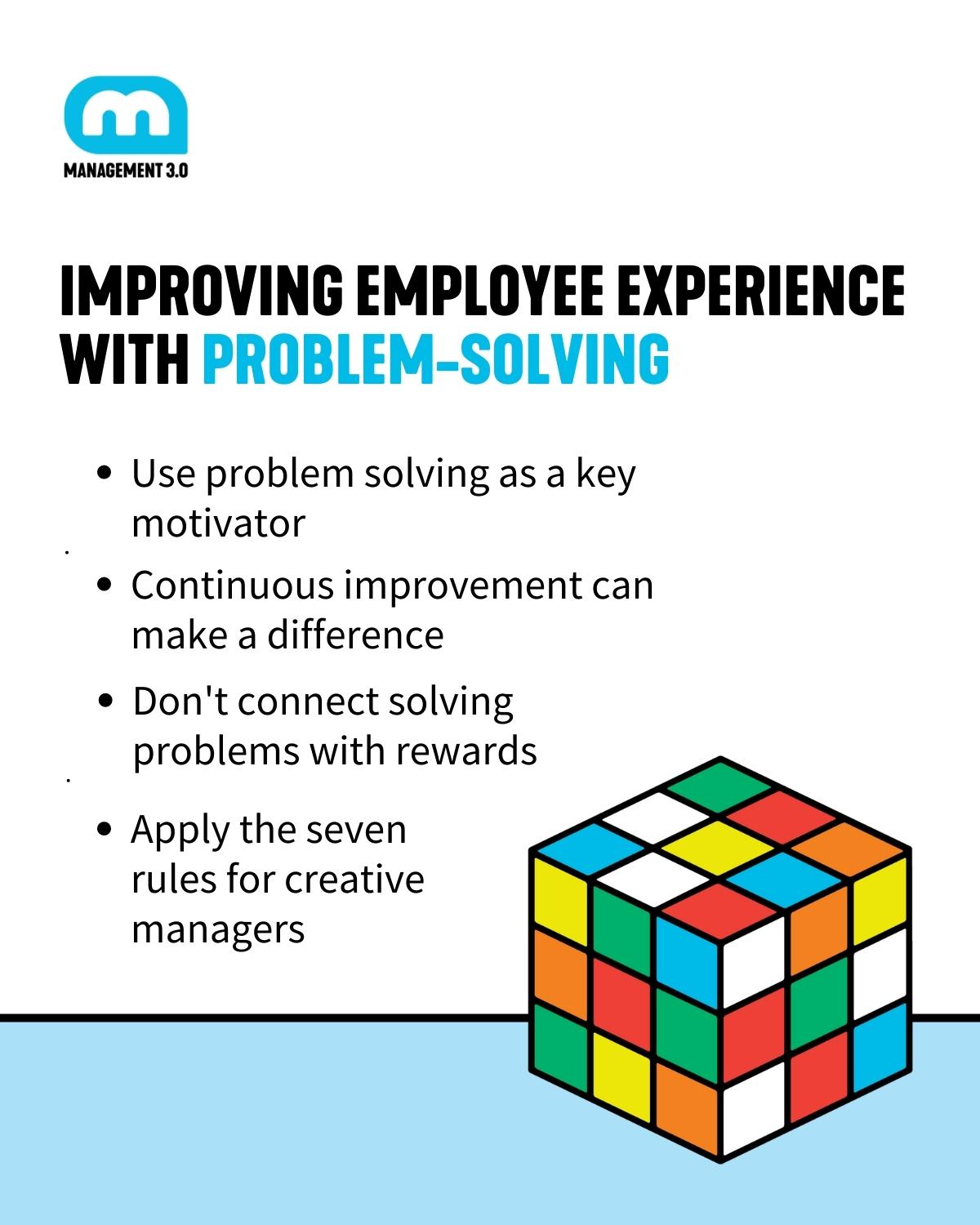
We start solving problems from a very early age (the alphabet, learning to eat, driving a bicycle etc.). Then, everyday activities sharpen our problem-solving skills and enable us to solve more complex issues.
As an adult, you can still develop your problem-solving skills by:
- Daily practicing of logic games, such as chess, and puzzles like Sudoku.
- Video games can teach you how to deal with failure and persist in achieving your goals.
- Keep an idea journal or blog as a collection of all your ideas, thoughts, and patterns.
- Think outside of the box – take a different perspective to understand the problem better.
- Practice brainstorming combined with mind mapping, working with your team.
- Put yourself in new situations – take on a challenging project at work.
- Start using the “what if” mindset in daily circumstances and test new approaches.
- Read more books on creativity and articles which cover your areas of interest.
I also believe coaching can help build creativity and problem-solving skills, encouraging people to take greater ownership of their work and commit to corporate goals. A coach can provide clear guidance as to what is important at the moment; they help people better, focus, and move into action. By asking powerful questions and challenging others to think outside of the box, the coach removes their barriers and lets them see the situation from a new perspective.
Coaching can provide structure so people develop their own expertise and insights to contribute better when problems arise and the pressure to succeed is growing.
The interview is an excellent opportunity to research a candidate’s problem-solving skills, and STAR questions should be related to their previous experience dealing with problems. A candidate with good problem-solving skills can quickly embed in the team and become a valuable asset for the company.
In my Agility in HR workshops , we regularly discuss interview questions. Some popular STAR questions are:
- “If you cannot find a solution to a problem, how do you deal with the situation?”
- “How do you react when faced with unexpected problems or challenges?”
- “Describe an occasion when you had to adapt at the last minute. How did you handle this?”
Problem-solving requires the ability to identify a problem, find the root cause, create solutions, and execute them. All these steps are essential for achieving the desired results.
Some of the skills that problem solvers must constantly sharpen are:
- Collaborative communication . Clear communication is essential when you explain the problem and the solution to your teammates. During brainstorming sessions, asking the right questions to determine the root cause , as well as synergic collaboration are needed.
- Active listening is important to prevent mistakes as you can absorb the details your colleagues tell you about the problem. Use open-ended questions for clarification, and always be open to feedback and views that differ from yours.
- Coachability. The willingness to accept feedback and the ability to improve. Learning from more experienced people, being curious to ask many questions, constructively using your ego, skipping excuses and blaming others, and accepting Feedback Wraps from your coach.
- Decision making . Problems cannot be solved without risk-taking and bringing important decisions (including relevant data, levels of delegation, alternative solutions etc.) to the forefront.
- Critical thinking . Be 100% objective when you try to find the cause of the problem. Skip ego trips and personal biases. Identify your mistakes in the thinking process and show personal accountability .
- Research and data analysis . Proper research allows you to diagnose the actual problem, not just the symptoms. If the cause of the problem is not immediately apparent, you can use the power of data to discover the issue’s history, some patterns, future trends, etc.
- Persistence . Trust in the problem-solving process you have designed and follow every step with patience and persistence; even when you fail repeatedly, do not give up. Keep moving and remember Thomas Edison’s quote: “I have not failed. I have just found 9,999 ways that do not work.”
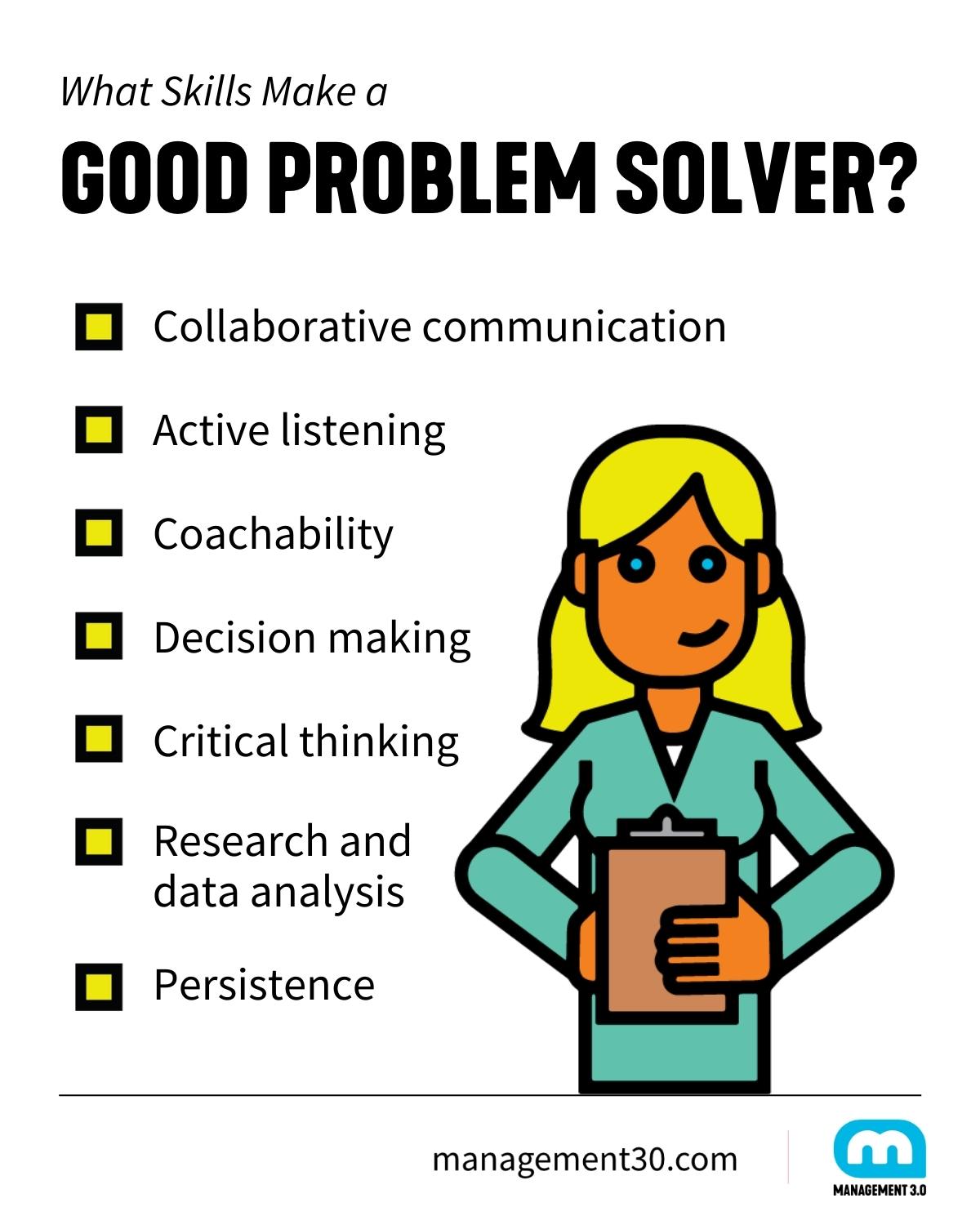
In the new VUCA world we now live in, problem solving is a crucial soft skill, and employers are actively seeking people with this skill set because they can prepare for problems before they arise. Problem solvers better identify opportunities, understand their environment, create a solution, and generate ideas that lead to great results and success.
According to a study made by LinkedIn Learning in August 2022 , future skills are rapidly changing, and problem solving is among the top soft skills employers search for from their candidates, as well as communication and leadership skills .
Using all aforementioned tools and practices from Management 3.0, following the guides, and sharpening your skills, will help you not only to be effective in resolving the problems that may arise, but also to solve them with enthusiasm and passion. They will create a higher level of engagement and collaboration in the team and help unleash people’s creativity and innovation. A win-win for everyone!
Photo by Parabol on Unsplash
Have you already read these?
Why you should hire someone with a side hustle, building learning organizations and agile adoptions always starts with shu ha ri, 9 reasons why quitting your job could be good for you, how to find a job you’ll be happy at, privacy overview, sign up for our engaging newsletter.

Subscribe Here!
Wait a second!
Buy Meddlers Game
Buy Kudo Cards
Buy Change Management Game
Buy Moving Motivators Game
Buy Delegation Poker Cards
Black Friday Sale - Up To 42% Off!
How to Conduct a Problem-Solving Session with Human Resources?
October 26, 2023
HR's role in conflict resolution is crucial for maintaining a positive work environment and boosting employee satisfaction. Effective problem-solving involves identifying issues, gathering relevant information, and setting clear objectives. During sessions, HR should establish ground rules, encourage open communication, and use techniques like mediation and negotiation. Post-session actions include evaluating outcomes, implementing solutions, and monitoring progress to ensure lasting success.
Arpit Bhavsar

In any organization, human resources (HR) plays a vital role in resolving conflicts and finding effective solutions to problems that arise. Problem-solving sessions with HR are crucial for maintaining a harmonious work environment and promoting employee satisfaction. In this article, we will explore the steps involved in conducting a problem-solving session with human resources and how to ensure its success.
Understanding the Importance of Problem-Solving in HR
Effective problem-solving is a key responsibility of HR professionals. They are the mediators and facilitators in conflict resolution within the organization. HR professionals are trained to address various issues that arise among employees and between employees and management. By proactively managing conflicts, HR can create a positive work environment, leading to increased employee satisfaction and improved overall productivity.
HR professionals play a crucial role in maintaining harmony and resolving conflicts within the workplace. They possess the necessary skills and knowledge to navigate through complex interpersonal dynamics and find solutions that are fair and satisfactory to all parties involved. Through their expertise, HR professionals ensure that conflicts are addressed promptly and effectively, preventing them from escalating and causing further disruptions in the workplace.
The Role of HR in Conflict Resolution
HR professionals act as impartial third parties when conflicts arise. They listen to the concerns of all parties involved and work towards finding a fair and satisfactory resolution. By maintaining confidentiality and trust, HR professionals can create an open and safe space for employees to express their grievances. They also ensure that all parties are treated fairly and that any resolutions align with company policies and regulations.
When conflicts arise, HR professionals employ various conflict resolution techniques such as mediation, negotiation, and arbitration. They facilitate constructive dialogue between conflicting parties, encouraging them to express their perspectives and concerns. Through active listening and effective communication, HR professionals help parties understand each other’s viewpoints, leading to a greater likelihood of finding common ground and resolving the conflict amicably.
Furthermore, HR professionals play a crucial role in preventing conflicts from arising in the first place. They proactively identify potential sources of conflict within the organization and implement strategies to address them. By fostering a culture of open communication and promoting positive relationships among employees, HR professionals create an environment where conflicts are less likely to occur.
The Impact of Effective Problem-Solving on Employee Satisfaction
When conflicts and problems are effectively resolved through problem-solving sessions, employees feel heard and valued. This leads to increased job satisfaction, engagement, and commitment towards their work and the organization. Moreover, it fosters a culture of open communication, collaboration, and teamwork, which are essential for success within any organization.
Employees who witness effective problem-solving in action are more likely to trust the HR department and have confidence in its ability to handle conflicts. This, in turn, enhances employee morale and creates a positive work environment where individuals feel supported and empowered. When employees know that their concerns will be taken seriously and addressed promptly, they are more likely to be proactive in addressing issues and working towards their resolution.
Furthermore, effective problem-solving in HR contributes to the overall organizational success. By resolving conflicts and addressing underlying issues, HR professionals create a harmonious work environment where employees can focus on their tasks and responsibilities. This leads to improved productivity, efficiency, and effectiveness across the organization, ultimately contributing to its growth and success.
Preparing for a Problem-Solving Session
Before conducting a problem-solving session, certain preparatory steps should be taken to ensure its effectiveness. These steps involve careful planning and thorough preparation to address the specific issues at hand.
Identifying the Issues
The first step in preparing for a problem-solving session is identifying the specific issues that need to be addressed. This involves gathering information from various sources, such as employee feedback, performance reviews, and incident reports. By clearly defining the problems, HR professionals can focus the session and avoid wasting time on unrelated matters.
During the process of identifying the issues, it is important to consider the root causes behind them. This requires a comprehensive analysis of the situation, taking into account both internal and external factors that may contribute to the problems. By understanding the underlying causes, HR professionals can develop effective strategies to address and resolve the issues.
Gathering Relevant Information
Once the issues are identified, it is crucial to gather all relevant information related to the problems. This may include reviewing relevant policies, procedures, and documentation, as well as interviewing the individuals involved to gain a comprehensive understanding of the situation. Collecting sufficient data ensures that the problem-solving session is based on accurate information and facilitates informed decision-making.
In addition to gathering information, it is also important to consider the perspectives of all stakeholders involved. This includes not only the employees directly affected by the issues but also managers, supervisors, and other relevant parties. By taking into account different viewpoints, HR professionals can gain a more holistic understanding of the problems and develop solutions that address the needs and concerns of all parties involved.
Setting Clear Objectives for the Session
Before commencing the problem-solving session, HR professionals should establish clear objectives. These objectives define the desired outcomes of the session, such as resolving conflicts, improving communication, or reaching consensus on a particular issue. Clear objectives help keep the session focused and guide the discussions towards achieving the desired results.
Setting clear objectives also involves prioritizing the issues to be addressed. Not all problems may require immediate attention, and some may be more critical than others. By prioritizing the issues, HR professionals can allocate the necessary time and resources to each problem, ensuring that the most pressing matters are adequately addressed during the session.
In addition to setting objectives, it is also important to establish a timeline for the problem-solving session. This helps create a sense of urgency and ensures that the session does not drag on indefinitely. By setting a timeline, HR professionals can effectively manage the session and ensure that all necessary discussions and activities are completed within the allocated time.
Conducting the Problem-Solving Session
During the problem-solving session, HR professionals need to follow certain guidelines to ensure its effectiveness. This involves establishing ground rules, encouraging open communication, and implementing effective problem-solving techniques.
Establishing Ground Rules
At the beginning of the session, it is important to establish ground rules that promote respectful and constructive communication. Ground rules may include active listening, speaking without interruptions, and maintaining confidentiality. These rules create a safe environment for participants to express their thoughts and concerns without fear of judgment or reprisal.
Additionally, HR professionals can emphasize the importance of respecting diverse perspectives and fostering an inclusive atmosphere. By setting clear expectations for behavior and interaction, participants can feel more comfortable sharing their ideas and engaging in meaningful dialogue.
Encouraging Open Communication
HR professionals should encourage open and honest communication throughout the problem-solving session. This involves actively listening to all parties involved, asking clarifying questions, and ensuring that everyone has an opportunity to express their viewpoints.
Furthermore, HR professionals can facilitate effective communication by creating a non-judgmental space where individuals feel heard and understood. They can encourage participants to actively engage in dialogue, share their experiences, and provide constructive feedback. By fostering an environment of trust and respect, HR professionals can help participants overcome communication barriers and build stronger relationships.
Implementing Effective Problem-Solving Techniques
During the session, HR professionals can utilize various problem-solving techniques to facilitate discussions and reach resolutions. These techniques may include brainstorming, mediation, negotiation, or consensus-building.
Brainstorming allows participants to generate a wide range of ideas and potential solutions. By encouraging creativity and suspending judgment, HR professionals can help participants explore innovative approaches to problem-solving.
Mediation techniques can be employed when conflicts arise during the session. HR professionals can act as neutral facilitators, guiding participants towards finding common ground and resolving differences. Through active listening and reframing, they can help parties understand each other’s perspectives and work towards mutually beneficial outcomes.
Negotiation skills are crucial in problem-solving sessions, as they enable HR professionals to find compromises and trade-offs that satisfy the needs of all parties involved. By focusing on interests rather than positions, HR professionals can help participants identify shared goals and reach mutually agreeable solutions.
Consensus-building involves fostering collaboration and reaching a collective decision. HR professionals can facilitate discussions that allow participants to explore different viewpoints, analyze potential consequences, and ultimately arrive at a consensus that best addresses the identified problems.
In conclusion, conducting an effective problem-solving session requires HR professionals to establish ground rules, encourage open communication, and implement various problem-solving techniques. By creating a safe and inclusive environment, facilitating meaningful dialogue, and guiding participants towards collaborative solutions, HR professionals can help organizations address challenges and foster a culture of continuous improvement.
Post-Session Actions and Follow-ups
Once the problem-solving session has concluded, there are important steps to take to ensure the agreed-upon solutions are implemented and progress is monitored.
Evaluating the Outcome of the Session
HR professionals should evaluate the outcomes of the problem-solving session to assess its effectiveness. This involves considering whether the identified issues were adequately addressed, if all parties are satisfied with the resolution, and if any follow-up actions are necessary. Evaluation helps identify areas for improvement and allows HR professionals to refine their problem-solving skills for future sessions.
Implementing Agreed Upon Solutions
After the session, it is essential to implement the agreed-upon solutions. HR professionals should communicate the resolutions to all relevant individuals and ensure that appropriate actions are taken promptly. Clear communication and follow-through on the agreed solutions demonstrate the commitment of the organization towards resolving conflicts and improving the work environment.
Monitoring Progress and Providing Feedback
Regularly monitoring progress and providing feedback is crucial to ensure the effectiveness and sustainability of the solutions. HR professionals should follow up with the individuals involved to determine if the agreed-upon solutions are being implemented and if they are achieving the desired outcomes. Ongoing communication and support from HR demonstrate the organization’s commitment to continuous improvement and employee satisfaction.
Conducting problem-solving sessions with human resources is an essential part of maintaining a healthy and productive work environment. By understanding the importance of problem-solving, adequately preparing for the session, conducting it effectively, and following up on agreed solutions, HR professionals can create a positive and collaborative workplace culture. Ultimately, this leads to increased employee satisfaction, improved productivity, and the overall success of the organization.
Check out Avado, the UK’s most trusted CIPD course provider today for HR and L&D courses:
CIPD Level 3 HR Courses : The CIPD Level 3 Certificate in people practice is ideal for anyone looking to start a career in either HR or Learning and Development. CIPD Level 5 HR Course : The CIPD Level 5 Associate Diploma in People Management will help you build on your existing HR knowledge. CIPD Level 5 L&D Course : The CIPD Level 5 Diploma in Organisational Learning and Development is the most comprehensive course available for L&D professionals, ideal for you if you want to formalise your existing experience, skills and knowledge. CIPD Level 7 HR Course : The CIPD Level 7 Advanced Diploma is aimed at expanding learners’ autonomy so they can strategically direct organisations and their people.
If you aspire to become a digital marketing manager or explore the senior level of your career have a look at the squared digital marketing programme .
HR’s role in conflict resolution is crucial for maintaining a positive work environment and boosting employee satisfaction. Effective problem-solving involves identifying issues, gathering relevant information, and setting clear objectives. During sessions, HR should establish ground rules, encourage open communication, and use techniques like mediation and negotiation. Post-session actions include evaluating outcomes, implementing solutions, and monitoring progress to ensure lasting success.
HR training, delivered seamlessly online for busy professionals
About the author, related articles.

In 2025, HR professionals must be adaptable, strategic, and tech-savvy. Key skills include communication, organisational acumen, HR strategy, flexibility, tech proficiency, and data-driven decision-making. Explore Avado’s expert-led CIPD courses to gain these skills and stay ahead in the evolving HR field.

Discover the key differences between Human Resources and People Operations, two essential approaches to managing your workforce. While HR focuses on operational tasks, People Ops takes a proactive, strategic view, enhancing employee experience and aligning with company goals. Find out which approach suits your organisation best.
A CIPD qualification is a powerful boost to your HR or L&D career. It opens doors to new opportunities, enhances your professional credibility, and equips you with practical skills. From increasing earning potential to global recognition, discover the top 10 benefits that make CIPD a game-changer for your career.

MIT School of Distance Learning
Distance Learning Institute for MBA / PGDM Courses
What is a Problem Solving skill? Why is it important in the Workplace?

Imagine this: You’re working on a project deadline approaching. Suddenly, a critical issue comes up. What do you do? This is where problem-solving skills come in. They are the ability to identify, analyse, and find solutions to challenges you face at work. Problem solving is an important skill for every employee , regardless of their position in 2024.
What Makes a Good Problem-Solver?
Effective problem-solving involves a series of steps:
Identifying the Problem: The first step is clearly understanding the issue. What is causing the problem? What are the symptoms?
Gathering Information: Collect information about the problem. Talk to colleagues, research online or review relevant data.
Analysing the Information: Analyse the information gathered. This will help you understand the root cause of the problem. Consider different perspectives and potential contributing factors.
Developing Solutions: Brainstorm potential solutions and consider their usefulness and effectiveness. Think creatively and explore various options.
Implementing a Solution: Choose the best solution and put it into action. Develop a plan to implement the solution effectively.
Evaluating the Outcome: Monitor the results of your solution. Did it solve the problem? If not, adjust your approach and try again.
Examples of Problem-Solving in the Workplace:
A customer service representative.
A customer calls with a complaint about a faulty product. The representative needs to –
- Identify the problem (faulty product),
- Gather information (customer details, product information),
- Analyse the cause (manufacturing defect),
- Develop solutions (replacement, repair),
- Implement a solution (send a replacement product) and
- Evaluate the outcome (did the customer receive the replacement).
A Digital Marketing manager
A marketing team faces a decline in website traffic. They use their problem-solving skills to –
- Analyse website data,
- Identify potential causes (outdated content, poor SEO),
- Brainstorm solutions (update content, improve SEO),
- Implement changes (create new content, optimise website) and
- Monitor results (track website traffic).
This proactive approach helps them address the problem and improve website performance.
A Software Developer
A program encounters a bug that prevents it from working correctly. The developer needs to –
- Identify the bug (error code),
- Gather information (code review, user reports),
- Analyse the cause (coding error),
- Develop solutions (code fix, update),
- Implement a solution (patch the program) and
- Evaluate the outcome (did the fix resolve the bug)
Why is Problem-Solving Important?
Strong problem-solving skills offer numerous benefits in the workplace:
Increased Efficiency: Employees can return to work faster by identifying and resolving issues quickly. This minimises disruptions and delays.
Improved Decision-Making: Effective problem solving skills enable employees to analyse situations. It helps them weigh options and make informed decisions.
Innovation and Creativity: Problem-solving often involves creative thinking. This helps to find new solutions and improve existing processes.
Stronger Teamwork: Collaboration is key to problem-solving. Effective communication and teamwork help teams find solutions together.
Enhanced Adaptability: The workplace is constantly changing. Problem-solving skills enable employees to adapt to new situations and challenges.
Developing Your Problem Solving Skills
There are ways to improve your problem-solving skills:
Practice makes perfect: The more you practice problem-solving, the better you become at it. Actively participate in team discussions and brainstorming sessions.
Learn from mistakes: Everyone makes mistakes. View challenges as opportunities to learn and improve your problem-solving approach.
Seek feedback: Ask colleagues or mentors for feedback on your problem-solving skills. This feedback can help you identify areas for improvement.
Take on new challenges: Volunteer for tasks or projects that require problem-solving skills. This will give you experience and help you develop your skills further.
Mastering Problem-Solving Skills
Problem-solving is a valuable skill for success in any workplace. MIT School of Distance Education caters to 360° skill development. Hence, we offer MIT Harbour – A unique blend of services that helps learners beyond academics
MIT Harbour will help you not just develop good problem solving skills but also;
- Soft skills enhancements
- Career Assistance
- Maintaining good mental health
- Balance studies with professional life
So, what are you waiting for? Sharpen your problem-solving skills with MIT Harbour and watch your career flourish!
Related Posts
Why pursue a career as supply chain analyst.

How AI Digital Marketing Courses are Shaping the Future of Advertising?
What is the best way to promote distance learning in 2021.
The service you are accessing is either under high load or has detected unusual activity from your network location.
To protect this service from abuse please complete the challenge below to continue.
What code is in the image? submit
Your unique support ID for this request is: 4926348433885300749.
If you see this challenge frequently or believe you are seeing it in error please record this ID and contact the Deakin University IT Service Desk . Additional information is available from the IT Knowledge Base .

IMAGES
VIDEO
COMMENTS
This is why innovation as a facet of problem-solving in the workplace is key. Problem-solving in the workplace often involves a lot of teamwork. Collaborating on a problem is a great way for a team to bond and learn more about each other's strengths. In this way, problem-solving contributes towards team unity and purpose.
Employees with poor problem solving ability cannot be relied upon when the unexpected happens, shifting the burden on other staff. As a result, problem solving ability is a common core competency when hiring professional, managerial, or technical roles, and highly prized by HR professionals and hiring managers.
Thinking outside of the box is an important problem-solving skill in the workplace, because it can often lead to better outcomes than the originally expected ones. 4. Ability to work under pressure. This is often one of the most important benefits of problem-solving skills in the workplace.
Examples of when HR could perform a problem analysis 1. Change management. Change management is the process of guiding individuals, teams, and organizations through the process of transitioning from the current organizational setup to a desired future organizational structure. This can involve systems, processes, technologies, team structures, and/or cultural changes.
Examples of problem-solving skills Problem-solving skills are abilities and competencies that you use to identify the cause of a problem and find an effective solution to it. They're transferable skills, which means you may use them in almost any role or profession.
Overall, problem-solving skills are valuable for HR professionals, and their impact on business outcomes cannot be overstated. Developing Problem Solving Skills For HR Professionals. Problem-solving is a skill that can be developed with practice and experience. Here are some ways HR professionals can enhance their problem-solving skills:
Problem-solving skills are important if you have to fix things that do not work. When your processes are not working as planned, problem solving will give you the structure and mechanisms to identify issues, figure out why things are broken, and take actions to fix them. Problem-solving skills are important when you have to address a risk.
Conducting problem-solving sessions with human resources is an essential part of maintaining a healthy and productive work environment. By understanding the importance of problem-solving, adequately preparing for the session, conducting it effectively, and following up on agreed solutions, HR professionals can create a positive and ...
Why is Problem-Solving Important? Strong problem-solving skills offer numerous benefits in the workplace: Increased Efficiency: Employees can return to work faster by identifying and resolving issues quickly. This minimises disruptions and delays. Improved Decision-Making: Effective problem solving skills enable employees to analyse situations ...
The importance of problem solving skills in the workplace. Problem solving is a vital skill in the workplace. The ability to think logically and creatively empowers individuals to tackle challenges and seize opportunities in all levels of business. This in turn helps to achieve the following benefits of problem solving skills in the workplace: